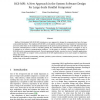Free Online Productivity Tools
i2Speak
i2Symbol
i2OCR
iTex2Img
iWeb2Print
iWeb2Shot
i2Type
iPdf2Split
iPdf2Merge
i2Bopomofo
i2Arabic
i2Style
i2Image
i2PDF
iLatex2Rtf
Sci2ools
122
click to vote
SC
2003
ACM
2003
ACM
BCS-MPI: A New Approach in the System Software Design for Large-Scale Parallel Computers
Buffered CoScheduled MPI (BCS-MPI) introduces a new approach to design the communication layer for largescale parallel machines. The emphasis of BCS-MPI is on the global coordination of a large number of communicating processes rather than on the traditional optimization of the point-to-point performance. BCS-MPI delays the interprocessor communication in order to schedule globally the communication pattern and it is designed on top of a minimal set of collective communication primitives. In this paper we describe a prototype implementation of BCS-MPI and its communication protocols. Several experimental results, executed on a set of scientific applications, show that BCS-MPI can compete with a production-level MPI implementation, but is much simpler to implement, debug and model.
Applied Computing | Collective Communication Primitives | Communication | Largescale Parallel Machines | SC 2003 |
Related Content
| Added | 05 Jul 2010 |
| Updated | 05 Jul 2010 |
| Type | Conference |
| Year | 2003 |
| Where | SC |
| Authors | Juan Fernández, Eitan Frachtenberg, Fabrizio Petrini |
Comments (0)

